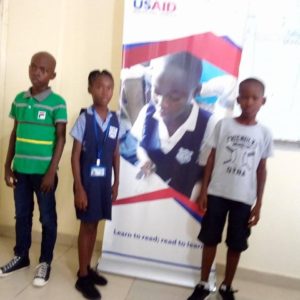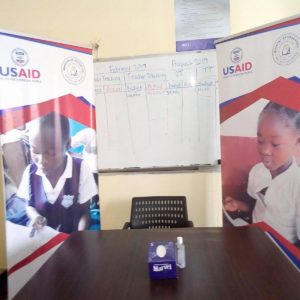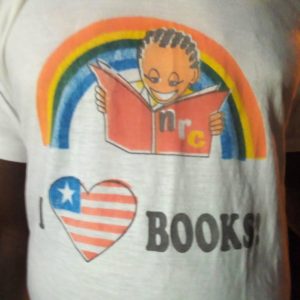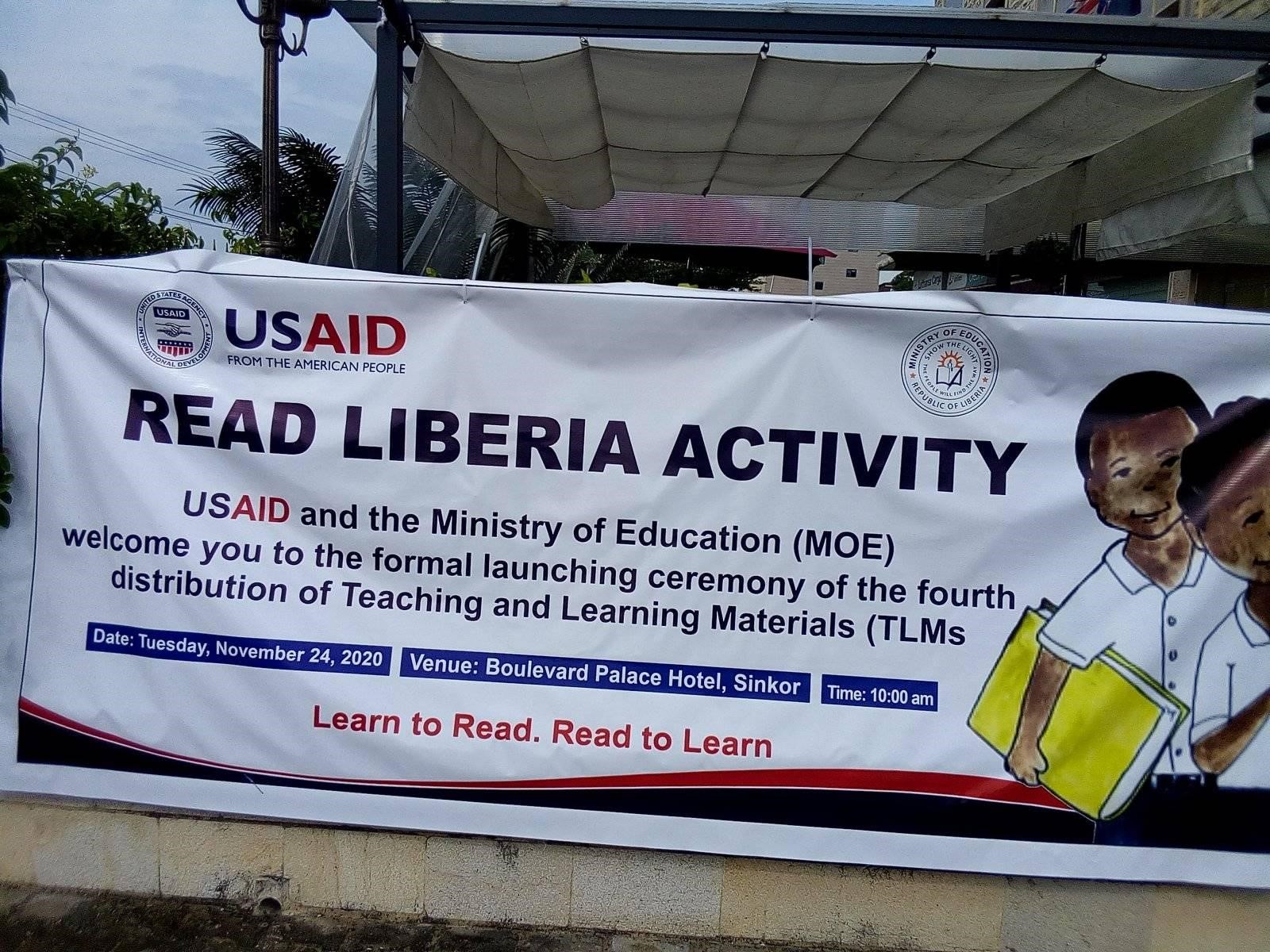By Samuel G. Dweh
President—Liberia Association of Writers (LAW), and Freelance Development Journalist Contacts—+231 (0)886618906/776583266/samuelosophy@yahoo.com/samuelosophy1@gmail.com
Professional Clarification: My intent, through this article, isn’t to “condemn” the U.S. Government’s selected “Implementers” of its hugely supported Liberia’s “Reading Campaign”. Rather, the article is aimed at calling the U.S. Government’s attention to the “little impact” (Glimmer—as used in the article’s title) the Project continues making, due to the use of “wrong channels” (Agents/Implementers) as “drivers” of the Project.
The article ends with recommendations—methods that would produce the “desired results” (sparkle—as used in the article’s title) envisaged by the U.S. Government and American citizens whose taxes form part of the funding their Country’s Government is pumping into this “Liberian Project”
“READING POWER”: PERSONAL SUCCESS STORIES
The Author of this article stopped at 12th grade (since 1997, on Ghana’s refugee camp), but he following academic records:
- Taught President Ellen Johnson-Sirleaf’s speechwriter (2011) and President George Manneh Weah’s speechwriter (2020) on grammatical constructions;
- Produced three personal Books (each over 200 pages), and has manuscripts of many more Books to be out soon;
- Produced the highest number of nation-building feature articles (on Liberian problems—with proffered solution methods) from 2011 to current time;
- Won development-based Journalism award (with his journalistic news story) of the Press Union of Liberia’s “Media Excellence Awards” (2018);
- Wrote Books and Thesis for university graduates;
- Singled-handedly produced a 12-page education newspaper (wrote and edited all stories)—six different editions;
- Served as proofreader, senior editor, editor-reporter at eight Liberian newspapers (between 2011 and 2015), including the Daily Observer (2011);
- Became president of Liberia’s oldest writers’ body—Liberia Association of Writers (LAW) in 2017;
- Many more reading-based achievements (past and current)
My successes were based on mentoring from the “right kind of teachers” selected for or placed over me—in Liberia, Ghana, and Nigeria.
AT A USAID-MINISTRY OF EDUCATION LAUNCH PROGRAM
The event was titled “USAID/MOE (Ministry of Education) Launch of the Distribution of Reading and Learning Materials”, held at the Boulevard Palace Hotel (located at 12th Street, Monrovia), on November 24, 2020.
I wasn’t allowed into the main venue of the launch (Boulevard Palace) on COVID-19-related reason (as Read Liberia’s Communications Director had insinuated), but Read Liberia’s Communications Director, Mr. Trokon Tarr (formerly in the Communications Department of the Liberia Revenue Authority), advised me to go to the Institution’s Head Office (located at 16th Street, Sinkor, Monrovia) and monitor there through Zoom (virtual platform) on a Projector available.
I obeyed; however, I didn’t meet any “Projector” with recording of the launch, and the activity (in the Boulevard Palace Hotel) was being relayed through personal laptop computers of Read Liberia’s officials. I couldn’t go near any of them, only to watch the main activity, due to Coronavirus-related health protocol being strictly adhered to in the Reading Room. (Another problem for me was lack of access to the materials launched and the grade level of Reader Getrude Momolu for promotion in my article. Mr. Tarr told me to remind him for photos through an e-mail, which I did the next day through his e-mail address he gave me, but he couldn’t send the information over a week up to the time this article was sent for publication. His colleague, Thomas P. Harris, relayed my request on December 1 for Reader Getrude Momolu’s grade level to appear in this article, but he didn’t respond up to the second the article was being sent for publication)
Only three students, representing three different Elementary Schools (out of hundreds of Schools with USAID’s financial presence), were present for the Reading segment of the launching. And only a total of four students were featured in the Reading segment. The voice of the fourth student (Rebecca Vanny, Age 12, of the John F. Bakalu Public School, Bong County) was relayed from Bong County when she was reading the story assigned to her: “Kwenah Goes to Monrovia”—about a teenager’s realized dream of seeing the Capital City.
For the three students physically present in Read Liberia’s Head Office (located on 16th Street, Sinkor, Monrovia), the first Reading Session (while the main launch session was going on in the Hotel) was in the Institution’s “Communications Room”. The second, main, Reading Session was held in the “Conference Room”—when “officials” of USAID (United States Agency for International Development) and MOE (Ministry of Education) had returned the main launch venue, to Read Liberia’s Head Office to “witness” the Reading Session.
After the first reading (in Read Liberia’s Communications Room) by one of the students in Read Liberia’s, a female official of Read Liberia’s Head Office relayed information from the main launching program venue: Boulevard Palace Hotel.
“Our bosses at the launching venue say the audio and picture qualities coming from Head Office, here, are bad. Please improve the picture quality, and tell each of the readers here to increase his or her voice level little.”
The person addressed was Thomas P. Harris, monitoring the Hotel-based event from a laptop computer.
The student was asked to re-read her story, to be clearly heard (audibility) by those at the launch venue.

The only Readers at Read Liberia’s Office during the USAID/MOE Teaching & Reading Materials Launch: Abraham Toe (age 10), Getrude Momolu (age 9) & Ezekiel Sackie (age 13)
Here is the information about each Reader released to me by a female official of Read Liberia’s Head Office on the launch day:
- Abraham Toe (age 10), Grade 2, Slipway Public School, Slipway Community, Monrovia, Montserrado County;
- Getrude Momolu (age 9), Linda Thomas-Greenfield Elementary & Junior High School, Robertsport, Margibi County; and
- Ezekiel Sackie (age 13), Grade 2, Soniwein Public School, Central Monrovia, Montserrado County.
Stories read were from a Reading Liberia’s Book titled “Let’s Read”, produced with funding from USAID.
Student Getrude was assigned to a story titled “At Home in the Sky”, which talks about the luminary relevance of the “stars”, written by Ruth Siburt (foreigner).
Student Abraham Toe read a story titled “A Good Friend”, written by Yolanda Isaac-Sie (Liberian), about two friends from different economic backgrounds—one from an advantaged family; the other from a disadvantaged one. The former shares her food with the latter.
Student Ezekiel Sackie was assigned to a story titled “Spider Tricked”, written by Kenneth Harding (Liberian), about a cunning hungry spider that isn’t getting the food promised it.
For the Reading segment of the launch, a total of four kid-students were featured by the program implementers. The fourth student was Rebecca Vanny, age 12, of John Bakalu Public School in Bong County (where she read from), assigned to a story titled “Kwenah Goes to Monrovia” (storyline: A kid’s fulfilled dream of seeing the Capital City)
On coaching from Read Liberia’s officials, each kid was mentally relaxed while reading, but stuttered on enunciation (phonetics) of some of the “strange words” in the story. All failed on words that started with or ended with “th”, producing a sound as if it were spelled ‘de’ or ‘ef’. The sound produced by one of the Readers on the word “earth”, in the story being read, would produced an “ef” accent. And each Reader correctly answered questions, on the story read, from Mr. Enoch M.J. Gbaa, Teacher Training and Coaching Supervisor, USAID Read Liberia Activity, and two other officials—female and male.
After the third student had read, a “Teacher” (female) and “parent” (male) were asked to give personal evaluatory comment about the entire U.S. Government-sponsored Liberian program. Each praised the Program.
The Teacher, Emily Kekula, of George Town Elementary & Junior High School, located on the Old Road, Monrovia, praised the Read Liberia Project on improving her phonetic presentation, as well as her colleagues and students at her School.
“Before many of us couldn’t correctly pronounce the word, n-a-m-e. But the coaching provided by this USAID-sponsored program has made me and other teachers and our students master the correct pronunciation of this word and many other English words that were hard for us,” Teacher Kekula added.
Mr. Aaron Q Sayee, Parent, Study Class Coordinator, and Community Chairman of the 26 Gate Community, Kakata, Margibi County, advised USAID and its implementer partners to take the Read Liberia Program beyond “third grade class, where USAID or the Ministry of Education is currently focusing on; they should stop it at 6th grade for now,” he said.
The “Teacher” and “Community Leader”, however, staggered on enunciations of some of the words, especially the one that began or ended with “th”.
The kid-Readers were transferred to the “Conference Room” when the Read Liberia’s Monitors with them received information about arrival of the “officials” from the main launch venue.

The Reading Cubicle at Read Liberia’s Head Office on the launching day.
I observed a “gender-bias”, against male, on the Project’s publicity banners for the symbolic “Reading Room”, created by a male with video recording gadgets, setting up his equipment for the commencement of the ‘main reading session’ (to be witnessed by officials who had minutes ago, from the main session at the Boulevard Palace Hotel)
“The two background banners have only a female student,” I expressed my concern to a male Read Liberia’s male official who had set up a representative Reading Room—with a black chair, desk, and “walls” (two banners)—and was mounting a video camera onto of a Tripod, for the main Reading Session.
I added: “The photo of only a female student, the same person, on both banners gives a message to a visitor that only a female student your Institution, Read Liberia, prioritizes. Please create a gender-balance by replacing one of the two banners with only a female reading, with one with a picture of a male student, to show gender-balance on the background banners.”
“That’s not a problem,” he retorted.
I only shrugged, as my response, to the guy’s don’t-care reply to my spoken concerns and suggestions.
The availability of only four schools (represented by four students) at the USAID-Liberian Ministry of Education “Launch of Distribution of Reading and Learning Materials” (on November 24, 2020) is a most visible proof of (majority) of school administrators’ lack of interest in the U.S. Government-sponsored Liberian Government’s “National reading promotion” Program. Responsible factors are listed below the next subheading.
THE U.S.-GOVERNMENT SPONSORED LIBERIA’S “NATIONAL READING CAMPAIGN”

Front of a T-shirt: Publicizing the Project

Back of a T-shirt: Publicizing the Project
To spark reading-related passion in Liberia’s school kids, the Liberian Government of Mrs. Ellen Johnson-Sirleaf launched an innovative project, named “National Reading Campaign”, in 2013—hugely funded by the United States Government led by Barrack Obama. The “connection” of the funding was Madam Linda Thomas-Greenfield, United States Embassy to Liberia during that time. The Ellen Sirleaf’s Government reciprocated her gesture by naming a school in her honor: “Linda Thomas-Greenfield Elementary & Junior High School”, located in Kakata, capital of Margibi County. The School was one of the four featured in the Reading Session of the USAID-Ministry of Education launch program on November 24.
The launch of the project, titled “National Reading Campaign”, was held at the Gray D. Allison High School, named in memory of a General in the Liberian Army during the Presidency of Samuel Kanyon Doe. The School’s spacious campus, located on the UN Drive, was jam-packed with students, local education stakeholders, Government officials, and representatives of the U.S. Embassy in Liberia. T-shirts with publicity information of the project were distributed to participants.
Few months later, publicity bill boards appeared in majority of Liberia’s 15 Counties. One information on some of the bill boards was: “Reading Expands A Reader’s Mind and Creates Opportunities”, with photo of a group of persons in “school uniforms” looking into a book marked “NRC” for National Reading Campaign. Photos of top Government officials (only Senators and Vice President) were featured on some of the bill boards in their Counties of origin. The one with the Vice President, Joseph Nyumah Boakai, in his County, Lofa, was stationed in the County’s capital, Foya, standing over 20 feet and facing the main road leading into the County.
Majority of the Country’s education stakeholders (including the Author of the article you’re reading) hailed President Sirleaf on such innovation—that would be one of the President’s “legacies” to be talked about in national discourse of “education”
The United States Government, through the United States Agency for International Development (USAID), shouldered much of the funding component for “publicity” of the (Liberian) National Reading Campaign. Millions of U.S. dollars was pumped into the project!
However, President Sirleaf “condemned” Liberia’s entire education system, describing it as a “mess”, in her “State of the Nation Address” in 2015. Automatically, the “National Reading Campaign”—a component part of the Country’s education system—was “condemned”
On “Education”, President lamented “many school kids’ inability to read a single line” in their Reading Books.” She also talked about most High School students’ inability on producing a sensible written composition during their class lessons and in regional Exams—West African Examination Council (WAEC) and the West African Senior Secondary Certificate Examinations (WASSCE)
Weeks later, I responded to President Sirleaf’s “blanket condemnation” through an article (lifted by some Liberian newspapers) In the article, I argued that the major cause of the “education mess” was based on her Government’s use of “wrong persons or wrong methods” as “teachers or education mentors” by the Government or owners of private schools.
In defense of my assertion, I stated the Government’s use of the “wrong channels” (persons) as “drivers” of the National Reading Campaign. Example: Throughout Madam Sirleaf’s Presidency, there was no “Reading Program” in any of the schools in the “native home” of most of the top Government
On “recommendations”, I said the Government should appointment “reading-passionate persons” (especially Liberian Authors) and long-years-of-service in its selection of “drivers” of the National Reading Campaign. I advised against “politicization” of the selection process (this was common during Madam Sirleaf’s Presidency on the “National Reading Campaign”)—choosing a person based only on his/her membership/loyalty to the ruling political party. Another suggestion, on photo for the Project publicity bill board, was the Government should give preference to highly financially disadvantaged students (attending schools in rural areas) who had passed WAEC or WASSCE, in spite of learning distractions from the lure of going to goldmine sometime to work for “school fee”. This preference will motivate other students in similar condition to learn harder.
Unfortunately, neither the Ellen Sirleaf’s Government nor U.S. Government’s “Representatives” on this other Liberian project practicalized my “suggestions” throughout Mrs. Sirleaf’s leadership of Liberia.
I’m not against political partisanism or fraternal connection, but I’m against any of these being used as a “condition” for absorbing a person into “national service”. (I had stated this in each of my articles on development of post-war Liberia)
Such “conditionality” brings in “ignoramuses” or “incompetent persons” (no sufficient knowledge or skills for the job you are placed over) and leave out “experienced persons” (knowledgeable people, based on practice-based knowledge)
A Country still shaking assembling its civil war-ravaged part, Liberia will progress slowly with any of these “conditions”.
LIBERIAN GOVERNMENT ON “GLOBAL READING-PROMOTION DAY: “INTERNATIONAL LITERACY DAY”
The United Nations Education and Scientific and Cultural Organization (UNESCO) created the the International Literacy Day in 1966, to urge and support UN-member Nations (including Liberia—a Founding Member of UN)—to promote “reading” their respective territory.
In 2015, the Ministry of Education celebrated, sent letters to Writers (including the Author of this article) to “read to young people in your neighborhood” (portion of the letter quoted) but Minister (George K. Werner) never read to any “group” during the day (None of the newspapers had story about the Minister’s Reading Session; no Radio station’s news had such. Only the celebration, held at the Conference Room of the Ministry, appeared featured in the Media). On the Ministry’s “appeal”, I read select chapters of my Liberian Education Novel (“Grade Sin” ) to assembly of students of the N.V. Massaquoi Elementary & Junior High School, located in the Township of West Point, my childhood community.
For this year (2020), during the Presidency of George Manneh Weah, the Ministry of Education (under University Professor Dao Ansu Sonii), didn’t celebrate the International Literacy Day, and didn’t honor invitation from partnership of the We-Care Foundation (a private Liberian reading-promotion NGO) and National Library of Liberia (located on Broad Street, Monrovia) to attend the partnership’s celebration of International Literacy Day (held at the National Library)
“We send invitation to the Ministry of Education, but we saw no representation from the Ministry,” an official of the We-Care Foundation (led by Mr. T. Michael Weah as Executive Director) to me few days after the celebration.
PROBLEM WITH THE U.S. GOVERNMENT-SPONSORED LIBERIAN PROJECT: WHY IT ISN’T ATTRACTIVE TO “MAJORITY” KIDS/ SCHOOL ADMINISTRATORS
Since its inception, selection of “Implementers” for the Read Liberia Project has been based more on “Academic Qualification” (candidate possession of a degree in Education), instead of more on “reading passion” of the candidate. The same condition is considered in the Implementing Agency’s selection of a Proposal from a sea of applications from Liberian organizations wanting to work with USAID/Read Liberia/Ministry of Education on the “Read Liberia Project” (The Proposal of my reading-and-writing promotion Institution—Refuge Communications, Inc.—sent to the Deputy Chief of Mission of the U.S. Embassy, Madam Alyson Grunder, on October 29, 2020, to connect my Institution to USAID, is still lying “ignored”) A factor related to academic-qualification condition is “fraternal condition”—selection of application on the applicant’s membership of the religious group or “secret society” the applicant recipient is part of. In most cases, those whose Proposals are accepted are “opportunistic readers” (getting involved only on economic reasons) that “passion-readers” (wanting to get involved based on the strong love for reading)
Most of the stories featured in the Read Liberia’s fictional stories’ Anthology (“Let’s Read”) lack “imageries” that spark “curiosity” in a child or facilitate the child’s visualization. Example: A hungry Elephant working for Ant with plenty food during rainy season.
Some of the stories in “Let’s Read” are “culturally irrelevant” to Liberia (foreign names), especially those by foreign writers.
The George Weah’s Government is practically ignoring the NRC established by the Government of his immediate predecessor—Ellen Johnson-Sirleaf.
RECOMMENDATIONS
The USAID (USAID) should incorporate Liberian Authors of Books into the U.S. Government-sponsored Liberian Reading Project, to serve as supporting “drivers” of the Project.
USAID should create “Reading Ambassadorial Body”, comprising of Authors and top Government officials to read to kids in schools and in communities. The financial Reading Ambassador should be compensated with some cash for transport, feeding, and to solve some “home problems”
The George Manneh Wead-led Government should show “practical interest” in the Government Government-sponsored National Reading Campaign of Liberia by ordering each School to have “Reading Session”, and should send out monitors to ensure the President’s instruction is being obeyed.
“Fraternity-based connection” should be left out in selecting “implementers” of the Liberian National Reading-promotion Project.
America’s Millions of dollars (U.S. currency) pumped in this other Liberian Project shouldn’t be allowed to WASTE!

